Why do you get complications from diabetes?
Working in a comprehensive internal medicine ward, more exposure to the disease is diabetes, and diabetic patients are increasingly younger, young people in their 30s, on the disease diagnosis on the list of 4-5: type 2 diabetes, hypertension, hyperlipidemia, hyperuricemia.
I often take one look at the diagnosis, and this patient's lifestyle and dietary habits will probably guess seven, eight, nine, like a fortune teller, through the patient's basic description, constantly confirming my judgment.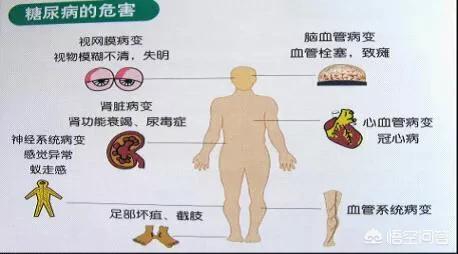
The worst thing about diabetes is not the high blood glucose, but the complications that come with chronic high blood glucose, which can have a serious impact on health and quality of life. Today, there is a tendency to link the development of diabetic complications to a substance called advanced glycation end products (AGEs).
AGEs, what are they? AGEs are harmful substances that are generated by the reaction of peroxides produced by the metabolic disorders of sugar, protein, and fat in a high-sugar environment in the human body. This substance has not done any good since it was created, how harmful is it?
The main culprits of diabetic complications (diabetic nephropathy, diabetic foot, diabetic retinopathy, lower extremity vasculopathy, dyslipidemia, hypertension, etc.). It increases the risk of developing various chronic diseases several times.
It is one of the risk factors for the development of Alzheimer's disease (dementia). It is born like a bandit, with a specific structure and is stable to enzymes (not easily removed by degradation). The production of AGEs in the human body takes about weeks or even months.
However, AGEs can also be generated by specific processing methods of foods in life, such as frying, deep-frying, grilling, baking, and other high-temperature processing methods, and it only takes a few minutes to generate them.
Look at the data set for the levels of AGEs in common foods (KU/100g)
Milk: 5; Rice: 9; Bread: 100; French Fries: 1522; Chocolate Chip Cookies: 1683; Fried Steak: 10058; BBQ: 18520; Fried Bacon: 92577
These values may be offensive to those of you who love food, but before the fact, it is not advisable to either adopt an ostrich policy or spray the editor. I also like to eat fried steak, barbecue, especially my mother-in-law is from Sichuan, do dry-fried beef tenderloin (Sichuan famous dish), but also repeatedly eat. But will control the degree and amount of diet, holidays occasionally eat once, not every day to eat, eat more vegetables and fruits, to reduce the damage to the health of AGEs.
I just want to remind those young people who have bad dietary habits, usually just eat a snack chips, cookies. Meals and like to order a takeaway, prefer dry stir-fry, barbecue, fried food, etc., really need to pay attention to the accumulation of AGEs in your body harm, soon may become the "three high" people (high blood sugar, high blood fat, high blood pressure).
How to Prevent Diabetes Complications and Reduce AGEs in the Body:
1. Whether through medication or diet and exercise, controlling your blood sugar is a top priority.
2. Increase intake of roughage and vegetables
3, appropriate supplementation of vitamin B6, vitamin E, folic acid, carotenoids and other antioxidants and so on.
4, change their eating habits, do not always surrounded by potato chips, cookies, instant noodles, fried food and other snacks.
5. Change your cooking style, stir-frying, steaming, boiling and stewing are all good ways to reduce AGEs.
6、If you have been diagnosed with diabetes, cardiovascular disease, or kidney disease, please strictly limit the production of dietary AGEs to prevent the disease from worsening, improve insulin sensitivity, and prolong your life ......
Author:Zhang鹍 National Registered Nutrition Technician, National Public Nutritionist Grade II, Hengdian Nutrition+ Nutrition Ambassador
Quite simply, the reason for the combined complications of diabetes is a consequence of uncontrolled blood sugar.
To put it bluntly, the human body is like a large precision machine, people have normal people with insulin secretion function, can always regulate the concentration or high and low blood sugar. But diabetics are miserable.
First, in Type I diabetes, there is an inability to produce enough insulin to regulate blood glucose, so the level of glucose in the blood is quite high. In Type II diabetes, insulin secretion often becomes abnormal after middle age.
The common feature or fate of these two groups of patients is that if blood sugar is not well controlled and regulated, the journey of life will be greatly shortened. This is often referred to as "diabetes is not scary, it is the complications that are scary".
Why do complications occur?
Because the hemoglobin in the body has been "soaking" in "sugar water" for many years, it has been "glycated" and lost its original function of hemoglobin. This is why diabetics should check their hemoglobin levels.
What does hemoglobin do? Hemoglobin is like the transporters in the body that carry oxygen to the organs of the body through the circulation of the blood vessels in the body. If these transporters are broken and glycated, the oxygen saturation level will decrease.
In layman's terms, if more of this hemoglobin is glycated, the body's organs will be deprived of oxygen; over time this will affect the normal functioning of the organs, thus giving rise to what are clinically referred to as complications, such as the kidneys, such as the retina, such as wounds that do not heal for a long period of time, and so on.
Therefore, the higher the "glycated" hemoglobin index, the more serious the lack of oxygen in the body organs, so diabetes has the "source of all diseases" of the "name", diabetes complications hundreds of kinds!
Diabetic friends, it is important to understand what glycated hemoglobin is, this indicator is more important than blood sugar!
 To summarize in a simple sentence, the root cause of diabetic complications is the pathology of blood vessels, i.e. atherosclerosis and plaque formation. For example, cardiovascular and cerebrovascular disease, as the name suggests, is caused by blockage and rupture of cardiovascular and cerebral blood vessels; diabetic nephropathy is caused by damage to the blood vessels in the kidneys, leading to malfunctioning of the kidneys; diabetic ophthalmopathy is the result of hemorrhage and fibrosis of blood vessels in the fundus of the eye, leading to the loss of blood supply to the retina.
To summarize in a simple sentence, the root cause of diabetic complications is the pathology of blood vessels, i.e. atherosclerosis and plaque formation. For example, cardiovascular and cerebrovascular disease, as the name suggests, is caused by blockage and rupture of cardiovascular and cerebral blood vessels; diabetic nephropathy is caused by damage to the blood vessels in the kidneys, leading to malfunctioning of the kidneys; diabetic ophthalmopathy is the result of hemorrhage and fibrosis of blood vessels in the fundus of the eye, leading to the loss of blood supply to the retina.
So how does diabetes cause atherosclerosis and plaque?
Normal blood vessels are very flexible, with very soft and smooth endothelial surfaces that offer little resistance to blood flow. When blood glucose rises, blood vessels are immersed in a high level of "sugar water", and in the long run, the endothelium of the blood vessels is damaged and tiny "wounds" are created.
These small "wounds" on the one hand to the flow of blood to bring resistance, blood stay longer, on the one hand to the blood in the blood fat and other substances to provide the opportunity to be deposited down; more and more fat deposits down, will cause a series of inflammatory reactions, like wounds infected with pus, localized ulceration and the formation of substances such as The "porridge"-like substance is formed.
These atherosclerotic substances replace the normal tissue of blood vessels, making the inner surface of blood vessels more and more uneven, the lumen is more and more narrow, the blood flow up more and more resistance, the surrounding tissues and organs will be ischemic, and the normal function is affected. If the blood vessels are blocked more seriously, the organs will undergo necrosis due to severe ischemia.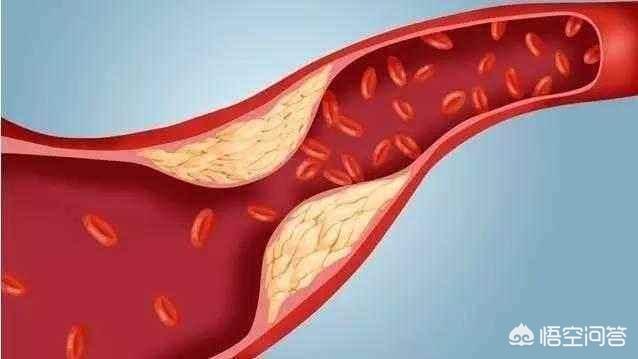
If the atherosclerosis somewhere ruptures and is exposed to the blood, it will attract a large number of platelets to gather and form a thrombus, causing a serious blockage of the blood vessels.
Therefore, diabetic patients must firstly control their blood sugar well to avoid damage to the endothelium of blood vessels and to eliminate the occurrence of atherosclerosis from the source. Secondly, blood pressure should be controlled well, high blood pressure and high blood sugar damage to blood vessels is the same reason; the third is to control blood lipids in the target range, to reduce the possibility of fat deposition in blood vessels. Generally speaking, diabetic patients to prevent the occurrence of complications, in blood glucose, blood pressure and blood lipids in the three aspects should reach a certain control target:
- Fasting blood glucose of at least less than 7.0 mmol/L, 2-hour postprandial blood glucose of at least less than 10.0 mmol/L, and glycosylated hemoglobin of at least less than 7.5%
- Blood pressure should be kept below 130/80 mmHg
- LDL in blood lipids should be kept below 2.6 mmol/L, or 1.8 mmol/L if cardiovascular complications have already occurred.
I hope this answer can help you, welcome to click on the attention and leave a message, together to learn and exchange more health knowledge.
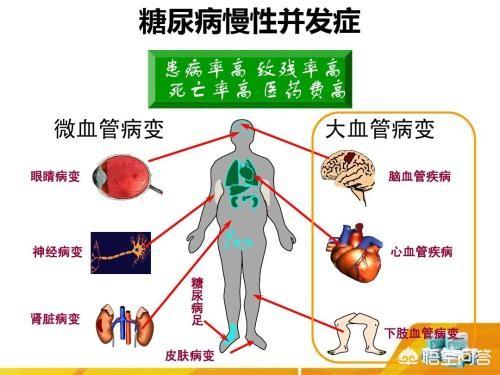
Every day it is said that the appearance of diabetes must be actively treated, good control of blood sugar, to avoid complications of diabetes! So why do you get complications if you don't control your diabetes well? What are the complications of diabetes? What can be done to prevent them?
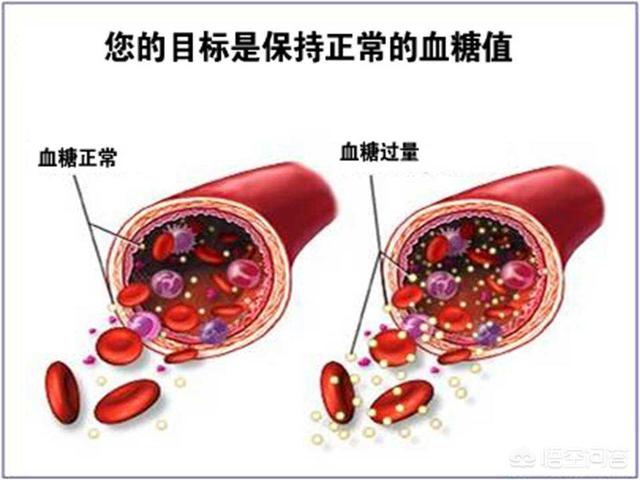
Elevated blood glucose, the whole body's blood vessels are immersed in sugar water, long-term these lesions, so that the blood viscosity increases, the poor elasticity of blood vessels, brittleness increases, blood vessels, these lesions lead to the body's poor blood circulation and supply (such as capillary clogging, which can cause diabetic eye disease, diabetic nephropathy, these lesions), and in addition to the glucose in the bloodstream, there is no way to be absorbed by the body, resulting in the body's various organs need energy can not keep up with the premature aging of the body. In addition, glucose is not absorbed by the body during blood circulation, leading to premature aging of all organs of the body because they cannot keep up with the amount of energy they need. ...... The common complications are diabetic ophthalmopathy (which can cause blindness), diabetic nephropathy (which can lead to renal failure), and diabetic peripheral vascular and neuropathic disease (which can lead to amputation). ......

In terms of prevention, it means that blood sugar must be strictly controlled, whether it is oral medication, increased exercise, strict dietary control, or subcutaneous insulin injection, and at the same time, regular monitoring of blood glucose changes, blood glucose fluctuations, timely adjustment.
I'm a small doctor, thanks for the likes and attention.
Learn more about health ☞ Stay tuned to Dr. Chang.
The development of diabetic complications is directly related to suboptimal glycemic control.
Diabetes has evolved into a universal health problem, everyone around, can see or hear the existence of diabetic patients. How to control blood sugar smoothly concerns the long-term prognosis of every diabetic.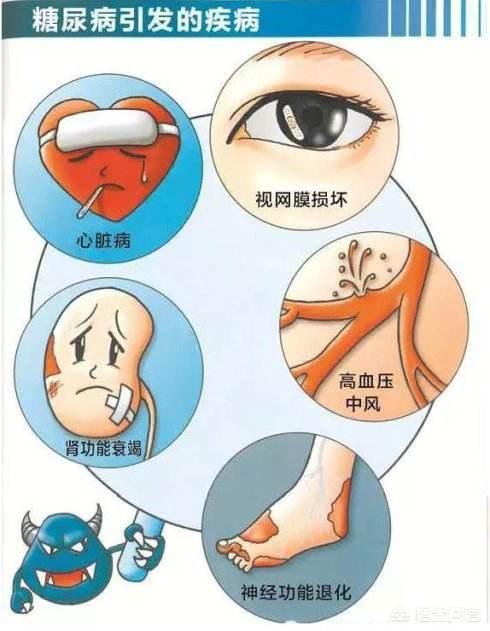
Acute and chronic complications of diabetes include ketoacidosis, shock, various infections, diabetic nephropathy, diabetic cardiomyopathy, atherosclerosis, diabetic retinopathy, central and peripheral neuropathy, diabetic foot and so on.
Therefore, every patient, should be taken seriously and actively involved in the treatment of diabetes, because whether diabetes will affect the patient's life expectancy is really related to the patient's own degree of attention! Diabetes education, medical nutrition therapy, exercise therapy, blood glucose monitoring and medication, the five-in-one model, in order to minimize the harm caused by diabetes to patients!
Every patient should take the initiative to understand diabetes, to do according to the caloric needs of scientific matching diet, strengthen aerobic exercise, establish blood glucose monitoring records, on time and according to the amount of application of hypoglycemic drugs, insulin, and strive to the long-term smooth control of blood glucose within the normal range. Many people may not be able to do this, which is an important reason why patients with various types of diabetes complications are often seen in the clinic. Diabetes is this characteristic, you are attentive to it, it generally does not cause you much harm, if you are not attentive to it, acute and chronic complications, will eventually make patients unbearable. In fact, hypertension disease is also this characteristic, patients must must pay attention!
Many people may not be able to do this, which is an important reason why patients with various types of diabetes complications are often seen in the clinic. Diabetes is this characteristic, you are attentive to it, it generally does not cause you much harm, if you are not attentive to it, acute and chronic complications, will eventually make patients unbearable. In fact, hypertension disease is also this characteristic, patients must must pay attention!

Diabetes is a metabolic disease caused by the relative insufficiency or absolute lack of insulin secretion in the body. The symptoms of diabetes will not be unfamiliar, but many people have questions about why they get complications, so first we need to know what are the complications of diabetes.
Acute complications include ketoacidosis, diabetic hyperosmolar state, lactic acidosis, and hypoglycemia. Due to insufficient insulin secretion, resulting in severe elevation of blood glucose, ketone bodies, leading to acute metabolic disorders, triggering diabetic ketoacidosis. In short, acute complications of diabetes are closely related to insulin secretion and the level of glycemic control.

The generation of chronic complications must be a greater concern for everyone. Chronic complications include macrovascular lesions, microvascular lesions, and neuropathy. Blood sugar refers to the sugar in the blood, mainly glucose, diabetic patients with poor glycemic control, blood vessels in a long-term high sugar state, so that the endothelial cells of the blood vessels are damaged, accelerate the aging of the blood vessel wall, reduce the elasticity of the blood vessels, resulting in atherosclerosis, which increases the risk of cardio-cerebral vascular disease; excessive fluctuations in blood glucose, but also increase the harm to the fundus and renal blood vessels; in addition to the elevation of glucose, the blood becomes viscous, easy to polymerize, resulting in the blood running speed is reduced, while increasing the risk of large and small blood vessel blockage; most of the glucose is present in the blood circulation, can not be properly transported to the organs of the body and peripheral nerves, accelerating the aging of the organs and thus affecting the normal functioning of the various systems, and at the same time damage to the peripheral nerves, so that the patient appears diabetic foot and numbness of the limbs, pain allergy or loss of other neuropathies, all of these are why diabetes can get complications These are the reasons why diabetes has complications.
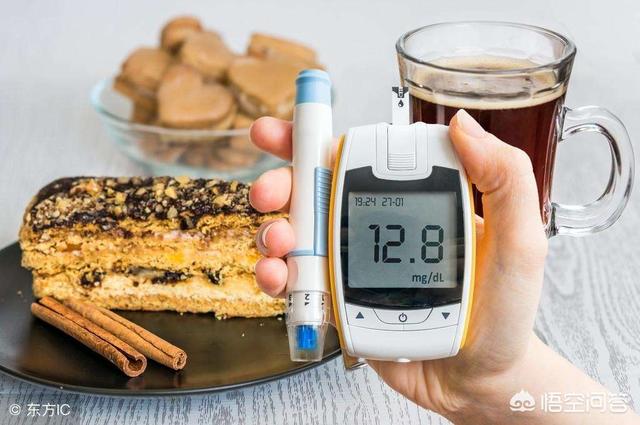
In summary, poor blood sugar control is the main reason for complications, high glucose state is both accelerate the catalyst of atherosclerosis and damage to the nerve executioner, so I hope that the majority of diabetic patients must comply with the doctor's instructions for medication, to maintain blood glucose continues to be in a normal steady state, and also from the lifestyle intervention, keep in mind the six words of the recipe "keep your mouth shut, open your legs! And also to intervene in lifestyle, remembering the six words "keep your mouth shut, keep your legs open" and practicing them, so as to reduce sugar intake and increase sugar consumption, and ultimately to reduce and delay the development of complications.
Respondent: Jiao Shuang, M.S.
Welcome to Life Calling for more useful health knowledge.
How do diabetes complications develop?
There are many complications of diabetes mellitus, the common ones include rotting feet, blindness, kidney failure, hypertension, cardiovascular disease, neuropathy, etc. These diseases are either disabling or fatal, which are indeed very scary, and they should be paid special attention to.
Diabetes mellitus, the main feature is persistent high blood sugar, the sugar in the blood can not be metabolized into energy that the body can use, so eat a lot of powerlessness, high blood sugar multi-vessel, long-term damage to the organs, laying the groundwork for complications.
Sugar in the blood more, caused the blood further viscous, flow more slowly, easy to form high blood pressure, blood sugar in the capillaries throughout the body, easy to block, and the capillaries around the eyes is more fine, easy to form retinopathy, resulting in blindness. The body can not utilize sugar, can only be replaced by protein, over time the body's protein the older the less, the end of the body is even less, if accidentally broke the mouth, without the participation of protein is difficult to heal, so long as it is not good, it will slowly ulcerate, the body's protein the older the less, the person will become thin, diabetes later in life more and more skinny, if the kidneys in the protein is too little, it is easy to develop nephropathy.
Looking at these complications, the core of the problem is that there is a lack of sugar in the cells of the body and a lot of sugar in the blood, and the core of the solution is to take the sugar in the blood and metabolize it into sugar that can be utilized by the body.
I. Diabetic complications include acute and chronic complications.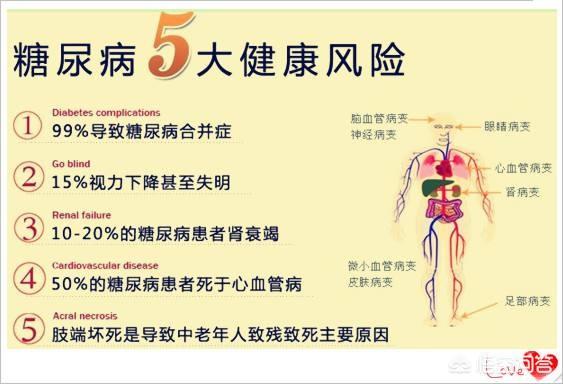
Second, the acute complications of diabetes mellitus include diabetic ketoacidosis, hyperglycemic hyperosmolar state, lactic acidosis, etc., the cause of which is mainly due to the severe lack of insulin activity and inappropriately high glucagon, resulting in excessive blood glucose, which leads to disorders of glucose, fat and protein metabolism, resulting in the disorders of the body's water, electrolyte and acid-base balance.
Third, chronic complications of diabetes mellitus are now widely believed to be caused by polyol bypass, protein kinase C, hexosamine activation, the abundance of advanced glycosylation products (AGEs), and hyperglycemia-induced increases in mitochondrial generation of reactive oxidation products (ROS).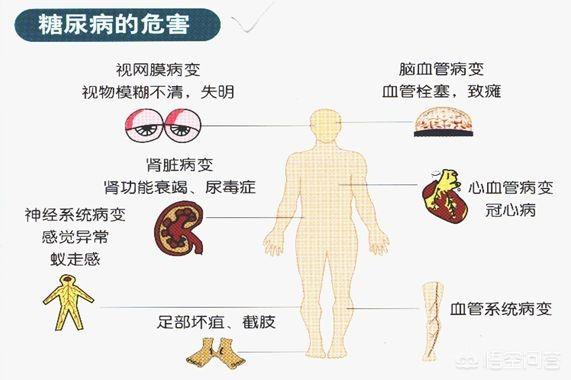
Fourth, to prevent the occurrence of diabetes complications is, of course, to bring blood glucose control up to standard. However, current research shows that as long as you have diabetes, complications will occur, but blood glucose control up to standard will delay the time of complications. Diabetes treatment includes dietary adjustments, exercise, medication, etc., in the previous my micro headlines and Q&A articles have detailed elaboration, the specifics can be looked up.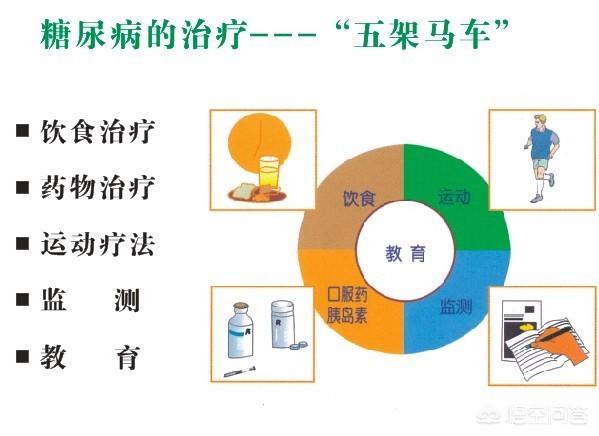

Diabetes is a systemic disease in which prolonged exposure to high blood sugar causes lesions in other tissues and organs, which develop over time, almost all over the body, from head to toe. The complications of diabetes are numerous and difficult to treat, and it is best to begin prevention and treatment at an early stage.
Complications of diabetes mellitus include cardiovascular lesions, retinopathy, nephropathy, and lower extremity vasculopathy, which are the main causes of death in diabetic patients. The common denominator of these diseases is that they are all caused by vascular disease. Blood carries various nutrients and circulates to all parts of the body through the blood vessels, and higher blood glucose levels will change the permeability of the blood vessels, resulting in lesions over time. Among the complications of diabetes, the incidence of neuropathy accounts for 60%, and the high incidence of other diseases such as eye lesions, hypertension, and kidney lesions should not be ignored.
Diabetes itself is very scary, but more scary or it caused by a series of complications, for these complications, prevention, early detection and early treatment is the best. Diabetic patients should first actively cooperate with the treatment, adhere to the combination of drugs and diet as far as possible to make blood sugar control at normal levels.
Cholesterol-rich foods such as animal offal, eggs, fish, etc. should be eaten sparingly, high oil and high salt cooking means is not desirable; diabetic patients have a lot of overweight, usually appropriate exercise to reduce blood glucose, weight loss has a very good effect, to maintain good habits, keep a happy mood, avoid excessive stress, actively adjust the mind, smoking and alcohol should be given up, in order to prevent the complications of diabetes to play a good role! The role.
Instructor: Hui Lichao, Deputy Chief Physician, Department of Endocrinology, Jinzhou Central Hospital.
She has been engaged in endocrine clinical work for 15 years and specializes in the diagnosis of diabetes and other common endocrine diseases.
If you find this article useful, please feel free to like or recommend it to your friends and follow [Medlink Media].
Why do complications occur even though you have been lowering your blood sugar rigorously? Why is it said that "diabetes is not scary, the most scary thing is complications"? Why does glucose-lowering treatment not only fail to stop complications, but also cause a vicious cycle?
If you don't know where the root cause of diabetes complications is, isn't it a wasted and blind treatment? Glucose-lowering treatment can't stop complications! Many patients mistakenly believe that "as long as they keep taking medication to lower their blood sugar, complications won't occur" and that "glucose-lowering medication can prevent and treat complications", but the truth may be the exact opposite! Keeping blood sugar at normal levels often triggers hypoglycemia, which causes blood sugar fluctuations. Each occurrence of hypoglycemia causes irreversible damage to brain cells. Many patients take one drug for a long time, and when it fails, they take a combination of drugs, and in the end, the glucose-lowering drugs don't help, so the only way is to take insulin.
Hyperglycemia, as well as blood sugar fluctuations, causes damage to the vascular, nervous, metabolic, and immune systems, yet, glucose-lowering treatments can't stop this damage! Cannot improve! Therefore, the reality is common: many patients do not have high blood sugar, but constipation, itching, eye disease, foot disease, kidney disease, heart attack, stroke and other complications ensue! Damage to the body system, causing complications! High blood sugar and blood sugar fluctuations damage the body's four major systems, which is the root cause of diabetes complications! Diabetes is not only hyperglycemic with disturbed sugar metabolism, but also disturbed metabolism of lipids and proteins. Blood sugar can not enter the cell, the cell is actually a lack of sugar, "starvation", because the body needs energy to maintain life, the body will take the dietary intake of nutrients, converted to fat stored in large quantities, atherosclerosis, so seventy percent of the patients ultimately died of complications - cardiovascular disease!
It is the fact that all four major body systems are compromised, which can lead to more serious complications, that makes diabetes the "root of all diseases"!
How to lower blood sugar naturally and prevent complications from occurring?
In recent years, the treatment of diabetes with active ingredients of natural medicines has attracted much attention because of its good efficacy, low toxicity and side effects, and good prospects for application.
Stanford Medical Center developed a natural blood sugar control - must sugar stable, containing bitter melon, mulberry leaves, large-flowered Vitis vinifera Wu boot vine and other natural ingredients, for assisting in blood sugar stable effect, side effects, and can effectively prevent and control complications, so it is also the American Diabetes Association pushed the best means of diabetes to assist in blood sugar stable.
Henan Wang Baomin is a more than ten years sugar age of sugar friends, western medicine and must sugar stable together, before fasting blood sugar 10.2, now to 6.5 or so, and especially stable.
This question and answer are from the site users, does not represent the position of the site, such as infringement, please contact the administrator to delete.